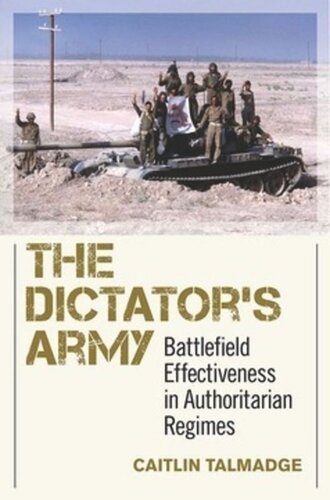

Most ebook files are in PDF format, so you can easily read them using various software such as Foxit Reader or directly on the Google Chrome browser.
Some ebook files are released by publishers in other formats such as .awz, .mobi, .epub, .fb2, etc. You may need to install specific software to read these formats on mobile/PC, such as Calibre.
Please read the tutorial at this link: https://ebookbell.com/faq
We offer FREE conversion to the popular formats you request; however, this may take some time. Therefore, right after payment, please email us, and we will try to provide the service as quickly as possible.
For some exceptional file formats or broken links (if any), please refrain from opening any disputes. Instead, email us first, and we will try to assist within a maximum of 6 hours.
EbookBell Team

4.8
84 reviewsIn The Dictator's Army, Caitlin Talmadge presents a compelling new argument to help us understand why authoritarian militaries sometimes fight very well—and sometimes very poorly. Talmadge's framework for understanding battlefield effectiveness focuses on four key sets of military organizational practices: promotion patterns, training regimens, command arrangements, and information management. Different regimes face different domestic and international threat environments, leading their militaries to adopt different policies in these key areas of organizational behavior.Authoritarian regimes facing significant coup threats are likely to adopt practices that squander the state's military power, while regimes lacking such threats and possessing ambitious foreign policy goals are likely to adopt the effective practices often associated with democracies. Talmadge shows the importance of threat conditions and military organizational practices for battlefield performance in two paired comparisons of states at war: North and South Vietnam (1963–1975) and Iran and Iraq (1980–1988). Drawing on extensive documentary sources, her analysis demonstrates that threats and practices can vary not only between authoritarian regimes but also within them, either over time or across different military units. The result is a persuasive explanation of otherwise puzzling behavior by authoritarian militaries. The Dictator's Army offers a vital practical tool for those seeking to assess the likely course, costs, and outcomes of future conflicts involving nondemocratic adversaries, allies, or coalition partners.